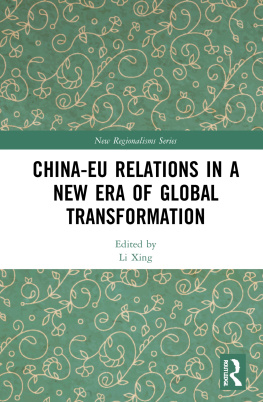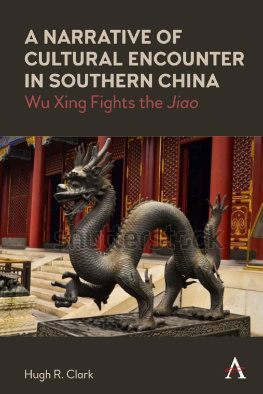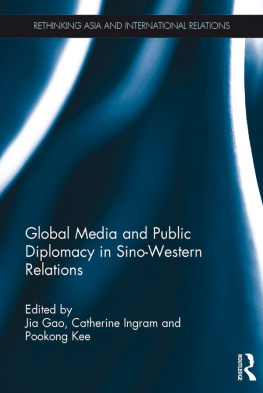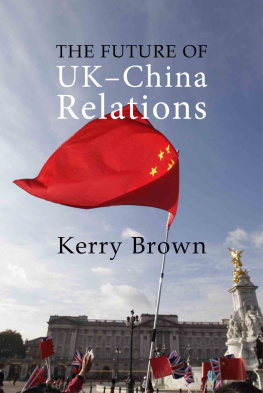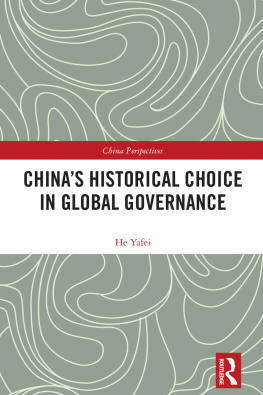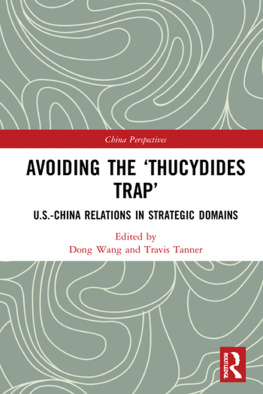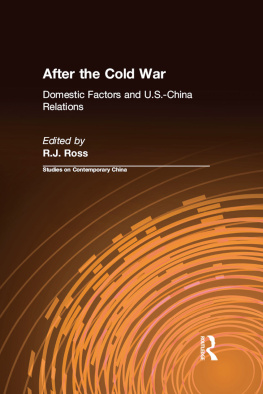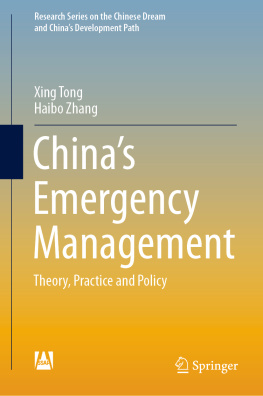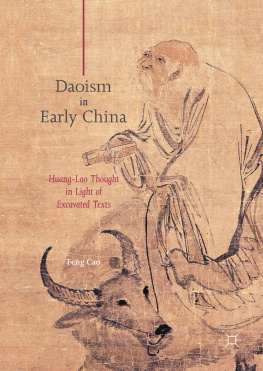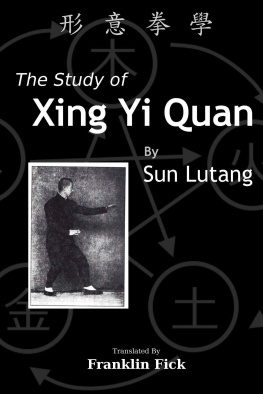China-EU Relations in a New Era of Global Transformation
This book draws together leading experts to examine the key issues in China-EU relations.
China-EU relations are increasingly complex and affected by a number of inter-related factors, such as Chinas global rise, growing China-US strategic competition, US global withdrawal, the transatlantic split, the China-Russia comprehensive alliance, and Brexit. The book highlights the struggles of both China and the EU to look for a dynamic and durable mode of engagement in an attempt to achieve the balance between opportunities and challenges, and between partnership and rivalry. International contributors explore how to conceptualise China-EU relations and identify their differences and commonalities such as the EUs role in Chinas foreign policy process and how the EU works with China as a strategic partner. Finally, it analyses Chinas and the EUs perceptions of their own present and future roles.
Shedding light on the perspectives of understanding and change in China-EU relations and its impact on multilateralism, it will appeal to researchers and professionals working in International Relations, International Political Economy and area studies who are interested in the rise of emerging powers and the changing world order.
Li Xing is a Professor in Research Center on Development and International Relations, Department of Politics and Society, Aalborg University, Denmark.
New Regionalisms Series
Series Editor: Timothy M. Shaw
The New Regionalisms series presents innovative analyses of a range of novel regional relations & institutions. Going beyond formal, interstate organisations, this interdisciplinary series builds on over two decades of the pioneering International Political Economy of New Regionalisms series, also edited by Professor Timothy M. Shaw.
New Regionalisms is creative & cosmopolitan, reflecting enquiries from & about the global South & North. It reinforces ongoing networks of analysts in both academia & think-tanks as well as international institutions concerned with micro-, meso- & macro-level regionalisms in the third decade of the 21st century & beyond.
Social Standards in EU and US Trade Agreements
Evgeny Postnikov
Terrorism, Security and Development in South Asia
National, Regional and Global Implications
M. Raymond Izarali and Dalbir Ahlawat
Mapping Arctic Paradiplomacy
Limits and Opportunities for Sub-National Actors in Arctic Governance
Edited by Mathieu Landriault, Jean-Franois Payette and Stphane Roussel
China-EU Relations in a New Era of Global Transformation
Edited by Li Xing
For more information about this series, please visit: https://www.routledge.com/New-Regionalisms-Series/book-series/ASHSER1146
First published 2022
by Routledge
2 Park Square, Milton Park, Abingdon, Oxon OX14 4RN
and by Routledge
605 Third Avenue, New York, NY 10158
Routledge is an imprint of the Taylor & Francis Group, an informa business
2022 selection and editorial matter, Li Xing; individual chapters, the contributors
The right of Li Xing to be identified as the author of the editorial material, and of the authors for their individual chapters, has been asserted in accordance with sections 77 and 78 of the Copyright, Designs and Patents Act 1988.
All rights reserved. No part of this book may be reprinted or reproduced or utilised in any form or by any electronic, mechanical, or other means, now known or hereafter invented, including photocopying and recording, or in any information storage or retrieval system, without permission in writing from the publishers.
Trademark notice: Product or corporate names may be trademarks or registered trademarks, and are used only for identification and explanation without intent to infringe.
British Library Cataloguing-in-Publication Data
A catalogue record for this book is available from the British Library
Library of Congress Cataloging-in-Publication Data
Names: Xing, Li, 1962 editor.
Title: China-EU relations in a new era of global transformation /
edited by Li Xing.
Other titles: China-European Union relations in a new era of global transformation
Description: Abingdon, Oxon; New York, NY: Routledge, 2021. |
Series: New regionalisms | Includes bibliographical references and index.
Identifiers: LCCN 2021001551 (print) | LCCN 2021001552 (ebook) | ISBN 9780367562397 (hardback) | ISBN 9781003096948 (ebook)
Subjects: LCSH: European Union countriesForeign relationsChina. | ChinaForeign relationsEuropean Union countries. | European Union countriesForeign economic relationsChina. | ChinaForeign relations economicEuropean Union countries. | European Union countriesForeign relations21st century. | ChinaForeign relations21st century.
Classification: LCC D2025.5.C6 C55 2021 (print) | LCC D2025.5.C6 (ebook) | DDC 341.242/20951dc23
LC record available at https://lccn.loc.gov/2021001551
LC ebook record available at https://lccn.loc.gov/2021001552
ISBN: 9780367562397 (hbk)
ISBN: 9780367562410 (pbk)
ISBN: 9781003096948 (ebk)
Typeset in Times New Roman
by codeMantra
Li Xing
The China-EU conundrum between strategic partnership and systemic rivalry
China and the European Union (EU) established formal diplomatic relations in 1975. Politically, China-EU relations are highly institutionalized in that they encompass a whole range of interactions such as an annual summit, regular ministerial meetings, and over 60 sectoral dialogues. Chinas government has so far issued three policy papers on the EU (Chinese Ministry of Foreign Affairs, 2003, 2014, 2018) providing important guidance to the development of China-EU relations. Since 2013, the China-EU comprehensive strategic partnership has been broadened and deepened in line with the EU-China 2020 Strategic Agenda for Cooperation agreed at the China-EU Summit in 2013.
China and the EU are enhancing cooperation and are moving closer towards one another on a number of global and regional challenges, such as Iran and North Koreas nuclear issues, multilateral governance, climate change, and free trade. On the one hand, the EU recognizes that China plays a pivotal role in global governance and the rules-based international order, and this comes with responsibilities (European Parliament, 2018). On the other hand, the EU is still struggling to adjust itself to the new situation in which Beijing has begun to shift away from the narrow pursuit of national aims towards a more assertive foreign and security policy, and increased financial, economic and security cooperation with a global outreach (European Parliament, 2018). Moreover, the EU is having difficulty in forming a unified position on a number of China-related issues, such as the use of Chinese telecommunication technology (Huawei), the South China Sea dispute, the Belt and Road Initiative (BRI), the China-Central and Eastern Europe (CEE) 17+1 cooperation format as well as problems regarding Chinese state capitalism model and Chinas commitment to human rights and democracy.
Economically China and the EU are each others largest trade partners. Many EU member states are involved in Beijings BRI initiative, and most of the member states join the Asian Infrastructure Investment Bank (AIIB). As China is moving fast beyond its lower-margin roots and climbing up global value chains, China-EU economic relations are changing from complementary to competitive relationships. China is also becoming a strong competitor to the EU in the third markets; for example in Latin America (Garca-Herrero et al., 2018), the relationships between China and the EU in the Horn of Africa are between complementarity and competition (Clingendael, 2018).

